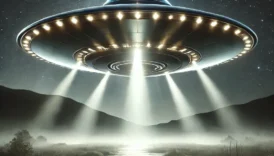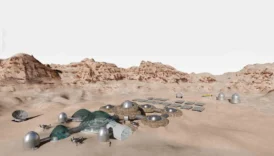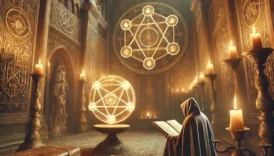Hollow Earth Theory | Intelligent Races Living Underground

The Kola Superdeep Borehole and the “Sounds of Hell” Legend
Who could have predicted that a scientific journey to the deepest point on Earth would spark one of the most chilling legends of all time? On September 27, 1984, Soviet scientists working on the Kola Superdeep Borehole recorded eerie sounds from the depths of the Earth. These sounds, later dubbed the “Sounds of Hell,” ignited countless theories and debates about the mysteries of the underground world.
- Hollow Earth Theory | Intelligent Races Living Underground
- The Kola Superdeep Borehole: A Record-Breaking Project
- The Mysterious Sounds
- Fact or Fiction?
- Myths and Hidden Civilizations
- The Agartha Myth
- Nazi Expeditions to Tibet
- The Antarctica Connection
- Evidence of High Heat and Radiation
- The Shiryayevo Caves: Strange Hatcheries
- Don River Subterranean Tombs
- Rising Temperatures in the Kola Borehole
- Could Life Exist Underground?
The Kola Superdeep Borehole: A Record-Breaking Project
The Kola Superdeep Borehole, a scientific endeavor initiated by the Soviet Union in 1970, aimed to drill as deep as possible into the Earth’s crust to better understand its structure. Over the course of two decades, scientists reached an unprecedented depth of 12,262 meters (40,230 feet), a world record that remains unbroken. However, the project became infamous not for its scientific discoveries but for the inexplicable sounds recorded during the drilling.
The Mysterious Sounds
At a depth of 12 kilometers (7.5 miles), scientists lowered sensitive audio equipment into the borehole. What they captured shocked them: screams, wails, and noises resembling human voices and mechanical hums. Witnesses described the recordings as sounding like human screams, eerie murmurs, and even signals reminiscent of telegraphs.
These recordings quickly became known as the “Sounds of Hell,” sparking global fascination and fear. Despite official Soviet efforts to downplay the incident, the legend persisted.
Fact or Fiction?
The authenticity of the recordings has been the subject of heated debate. Some researchers claim the sounds were real and captured at the specified depth. Others argue they were the result of audio interference or a hoax. The lack of official confirmation only adds to the mystery.
Theories About the Underground World
The Kola Superdeep Borehole isn’t the only story fueling curiosity about the mysteries beneath our feet. Throughout history, legends and theories about hidden civilizations, advanced technologies, and secret tunnels have captured the imagination of cultures worldwide.
Myths and Hidden Civilizations
From the Tibetan legends of Agartha to the mysterious underground passages of Antarctica, the idea of subterranean worlds has persisted across time and geography.
The Agartha Myth
According to Tibetan monks, Agartha is an advanced civilization located deep within the Earth. This mythical world is said to have its own sun, seas, and a thriving ecosystem. Entrances to Agartha are reportedly scattered across the globe, from the Himalayas to the Amazon rainforest and Antarctica.
Nazi Germany’s Fascination with the Subterranean
One of the most intriguing historical connections to the underground world involves Nazi Germany. Adolf Hitler and his inner circle believed that ancient civilizations held the key to ultimate power. They sought to uncover lost knowledge and technologies hidden deep within the Earth.
Nazi Expeditions to Tibet
During the 1930s, Nazi researchers traveled to Tibet to establish contact with local monks. These monks reportedly shared ancient maps and knowledge about subterranean tunnels. Hitler believed these maps could lead to gateways into the Earth’s interior, prompting further expeditions to Antarctica.
The Antarctica Connection
The Nazis allegedly established secret bases in Antarctica, where they discovered warm caves beneath miles of ice. These caves were said to lead to a hidden network of tunnels and possibly an underground civilization. Reports suggest that the Nazis used this information to develop advanced technology, including UFO-like flying machines.
Mohenjo-Daro and the Nuclear Explosion Theory
One of the most mysterious ancient cities, Mohenjo-Daro, located in present-day Pakistan, dates back over 3,500 years. Archaeological evidence suggests that this once-thriving city was destroyed by a sudden and catastrophic event.
Evidence of High Heat and Radiation
Excavations at Mohenjo-Daro have revealed melted stones and high radiation levels in human remains. The radiation levels were found to be 50 times higher than normal, and the melted stones suggest exposure to temperatures far exceeding those of ordinary fires. Some researchers theorize that the city may have been the site of an ancient nuclear explosion.
Other Mysterious Underground Discoveries
The fascination with underground mysteries extends to discoveries in other parts of the world. Some are explained as natural phenomena, while others defy easy explanation.
The Shiryayevo Caves: Strange Hatcheries
The Shiryayevo Caves in Russia have yielded one of the most bizarre finds in underground exploration. Researchers discovered transparent cubes containing embryo-like figures. These structures, described as “hatcheries,” raise questions about unknown species or ancient experiments.
Don River Subterranean Tombs
Near Russia’s Don River, archaeologists discovered underground tombs depicting humanoid reptilian figures. Local folklore tells of a dragon that once lived in the area, demanding sacrifices from the people.
The Science of the Underground World
While legends and myths fuel the imagination, science continues to explore the realities of the underground world.
Rising Temperatures in the Kola Borehole
One of the most significant findings of the Kola Superdeep Borehole was the unexpected rise in temperature at extreme depths. Temperatures exceeded 180°C (356°F) at 12 kilometers, forcing scientists to halt further drilling. Researchers speculate that this heat may result from the movement of fluids or proximity to the Earth’s core.
Could Life Exist Underground?
Scientific discoveries of microorganisms that thrive in extreme environments suggest that life could exist underground. However, current technology and understanding are insufficient to support long-term human habitation in such conditions.
Conclusion: The Mysteries of the Underground Await
The stories and discoveries about the underground world continue to captivate and intrigue us. From the “Sounds of Hell” to Agartha and the supposed Nazi bases in Antarctica, the mysteries of what lies beneath remain unsolved.
Perhaps hidden civilizations are deliberately avoiding contact with us. Or maybe we simply lack the technology to uncover their secrets. Until then, the underground world remains a frontier of both science and imagination.
What do you think? Could there be an entire world waiting to be discovered beneath our feet?





